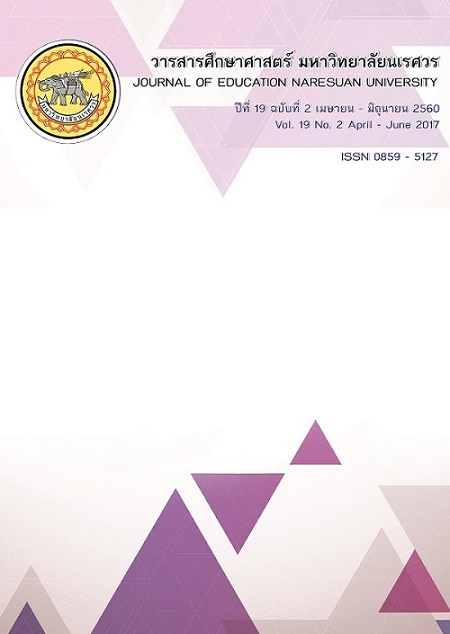การพัฒนาการรู้สิ่งแวดล้อมของนักเรียนชั้นมัธยมศึกษาปีที่ 3 โดยใช้การสอนแบบโครงการที่เน้นการคิดแก้ปัญหา
Main Article Content
Abstract
การวิจัยในครั้งมีความมุ่งหมาย เพื่อศึกษาและเปรียบเทียบการรู้สิ่งแวดล้อม ด้านความรู้ ความตระหนักต่อสิ่งแวดล้อม และความสามารถในการคิดแก้ปัญหาของนักเรียนที่เรียนโดยใช้การสอนแบบโครงการที่เน้นการคิดแก้ปัญหากับการเรียนแบบปกติ กลุ่มตัวอย่างเป็นนักเรียนชั้นมัธยมศึกษาปีที่ 3 กลุ่มทดลอง จำนวน 50 คน ที่เรียนโดยใช้การสอนแบบโครงการที่เน้นการคิดแก้ปัญหา และนักเรียนชั้นมัธยมศึกษาปีที่ 3 กลุ่มควบคุม จำนวน 50 คน ที่สอนแบบปกติ
ซึ่งนักเรียนทั้ง 2 กลุ่ม ได้มาโดยวิธีการสุ่มแบบกลุ่ม (Cluster Random Sampling) เครื่องมือที่ใช้ในการวิจัย ได้แก่ 1) แผนการจัดการเรียนรู้ 8 แผน สำหรับการจัดการเรียนรู้โดยใช้การสอนแบบโครงการที่เน้นการคิดแก้ปัญหา และการจัดการเรียนรู้แบบปกติ จำนวนอย่างละ 4 แผน แต่ละแผนใช้สอน 3 ชั่วโมงต่อสัปดาห์ 2) แบบวัดความรู้ด้านสิ่งแวดล้อม 3) แบบวัดความตระหนักต่อสิ่งแวดล้อม และ 4) แบบวัดความสามารถในการคิดแก้ปัญหาสิ่งแวดล้อม สถิติที่ใช้วิเคราะห์ข้อมูล ได้แก่ ร้อยละ ค่าเฉลี่ย ส่วนเบี่ยงเบนมาตรฐาน Paired t-test และ F-test (One-way MANCOVA และ ANCOVA) ผลการวิจัย พบว่า แผนการจัดการเรียนรู้โดยใช้การสอนแบบโครงการที่เน้นการคิดแก้ปัญหามีดัชนีประสิทธิผล เท่ากับ 0.7133 นักเรียนที่เรียนด้วยการสอนแบบโครงการที่เน้นการคิดแก้ปัญหา และการสอนแบบปกติ มีความรู้ด้านสิ่งแวดล้อม ความตระหนักต่อสิ่งแวดล้อม และความสามารถในการคิดแก้ปัญหาสิ่งแวดล้อม โดยรวมและรายด้านหลังเรียนเพิ่มขึ้นจากก่อนเรียน และนักเรียนที่เรียนโดยใช้รูปแบบการสอนแบบโครงการที่เน้นการคิดแก้ปัญหา มีความรู้ด้านสิ่งแวดล้อม ความตระหนักต่อสิ่งแวดล้อม ขั้นที่ 2 การตอบสนอง และการคิดแก้ปัญหาสิ่งแวดล้อม โดยรวมและรายด้าน 4 ด้าน คือ ด้านมลพิษทางน้ำ ด้านมลพิษทางอากาศ ด้านมลพิษทางเสียง และด้านมลพิษจากขยะมูลฝอย สูงกว่านักเรียนที่เรียนแบบปกติ
THE DEVELOPMENT OF ENVIRONMENTAL LITERACY OF MATTAYOMSUKSA
3 STUDENTS USING THE PROJECT-BASED TEACHING WITH
PROBLEM-SOLVING THINKING
This research aimed to study and compare environmental literacy in the areas of knowledge, awareness and ability in problem-solving thinking of the students who learned using the project-based learning with problem-based thinking and the traditional teaching method. The sample consisted of an experimental class of 50 Mathayomsuksa 3 students who learned using the problem-based project with problem-based thinking and a control class of 50 Mathayomsuksa 3 students who taught using the traditional teaching method. These students were randomly selected using the cluster random sampling technique. Research instruments included 1) 8 learning plans for the experimental class and for the control class, 4 plans each, and each plan for 3 hours of teaching in a week,
2) an environmental knowledge test, 3) a questionnaire on environmental awareness, and 4) a test on environmental problem-solving thinking. The collected data were analyzed using a percentage, a mean and a standard deviation, and for testing hypotheses the paired t- test and the F-test (One-way MANCOVA and ANCOVA) were employed. The major findings revealed that the lesson plans for project-based teaching with problem-based thinking had an effectiveness index of 0.7133. The experimental class and the control class showed gains in environmental knowledge, environmental awareness and ability in environmental problem-solving thinking in overall and in each aspect from before learning. In addition, the experimental class showed more environmental knowledge, environmental awareness in the stage 2: Responding, and environmental problem-based thinking in overall and in 4 aspects: Water Pollution, Air Pollution, Noise Pollution, and Waste Pollution, than did the control class.
Article Details
The owner of the article does not copy or violate any of its copyright. If any copyright infringement occurs or prosecution, in any case, the Editorial Board is not involved in all the rights to the owner of the article to be performed.


